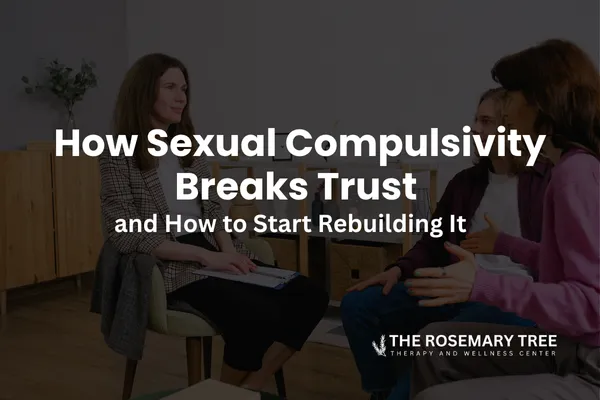
How Sexual Compulsivity Breaks Trust, and How to Start Rebuilding It
When Promises Stop Feeling Safe
When trust breaks, words lose their power. The “I’m sorry” that once brought hope now feels hollow. Every apology, every promise to change, becomes another reminder of how fragile the relationship has become.
For couples navigating sexual compulsivity, this loss of trust cuts deep. The betrayed partner feels trapped between love and fear, wanting to believe change is possible but terrified of being hurt again. The partner struggling with compulsivity often feels desperate for forgiveness but paralyzed by guilt and shame.
It becomes a painful dance: one reaching out for reassurance, the other shrinking under the weight of failure.
How Sexual Compulsivity Shatters Safety
Trust is not only emotional, it’s biological. When betrayal happens, the brain’s alarm system activates. The betrayed partner’s nervous system begins scanning for danger: tone changes, phone vibrations, unexplained absences.
Even minor behaviors can trigger panic, not because of insecurity but because the body no longer feels safe.
For the partner with compulsive behaviors, the cycle of secrecy and disclosure fuels more instability. They may promise honesty but still hide details out of fear, deepening the wound they want to heal.
Each new revelation reopens the trauma, reinforcing the message: “I can’t relax. I can’t trust.”
Why Quick Fixes Don’t Work
After betrayal, many couples rush toward repair, sharing passwords, setting new rules, or making promises to “move on.” While these steps can create temporary relief, they rarely rebuild trust in a lasting way.
That’s because trust is not rebuilt through control, it’s rebuilt through consistency, emotional safety, and accountability over time.
You cannot rebuild trust on top of avoidance. Both partners need a structured environment where emotions, trauma responses, and accountability are addressed together.
The Science of Broken Trust
In healthy relationships, trust acts as a safety signal in the brain. It tells your nervous system, “You can relax here.”
When betrayal happens, that signal reverses. The body associates closeness with danger. Even loving gestures can feel threatening. The betrayed partner’s body literally cannot distinguish between real safety and emotional risk until consistent repair has occurred.
This is why “forgive and forget” advice can feel impossible, it ignores how deeply trust is wired into the nervous system.
What Rebuilding Really Takes
Rebuilding trust after betrayal requires two parallel processes:
Accountability and Transparency
The partner who engaged in compulsive behaviors must take full responsibility, not just for the actions, but for the pain they caused. This means radical honesty, consistent follow-through, and a willingness to sit in discomfort without defensiveness.Safety and Healing for the Betrayed Partner
The betrayed partner needs space to express grief, anger, and confusion without being told to “move on.” Their nervous system must experience safety again before trust can return.
Healing happens when these two paths begin to align: accountability meets empathy, and emotional safety begins to replace chaos.
How Therapy Intensives Support This Process
At Rosemary Tree, our Accelerated Deep-Work Therapy Intensives are built for couples who have reached the breaking point, where weekly therapy no longer feels enough.
During these intensives, both partners are guided through multi-hour sessions that allow time for:
Full emotional processing without rushing or interruption
Structured disclosure and truth-telling in a safe environment
Nervous system regulation and trauma education
Tools for rebuilding emotional safety and communication
A customized roadmap for rebuilding trust together
Because the sessions are longer, both partners stay in the work long enough to move past surface-level reactions and into real understanding.
What Rebuilding Trust Feels Like
In the beginning, rebuilding trust feels fragile, like walking on new ice. But over time, small consistent actions begin to form a foundation.
You might start to notice:
Calm conversations replacing defensive arguments
Honesty offered without being forced
Empathy beginning to replace shame or anger
Emotional connection returning during small daily moments
These shifts are signs that the nervous system is beginning to feel safety again.
The Role of Compassion in Repair
Compassion is not the same as excusing harm. It’s choosing to look at the pain with understanding instead of only judgment.
For the partner who acted out, compassion means taking responsibility without collapsing into shame. For the betrayed partner, it means holding boundaries without losing empathy for their own healing.
When both people begin to practice compassion, for themselves and each other, the relationship starts to feel like a place of growth, not punishment.
If You’re Both Tired But Still Hopeful
Many couples who begin this work feel like they’ve tried everything. They’ve read the books, gone to weekly counseling, made promises, and still feel stuck.
That frustration doesn’t mean you’ve failed, it means the wounds run deeper than what an hour a week can heal. Intensives exist for this exact reason: to help couples go deeper, faster, and find the clarity they’ve been missing.
Final Thoughts
Trust is not rebuilt through words, it’s rebuilt through time, transparency, and compassion. If you’re both exhausted but not ready to give up, there is still a way forward.
If you know you need this, click here to submit an inquiry and we will get back to you right away to get the process started for you. This is an in-person service, but you can still reach out and have a conversation with us. We can talk with you and help you explore whether this next step feels right for you.


